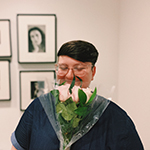Methods of Accounting
There’s something comforting about inventory,
futile as it may be, the act of assessment,
itself, a form of care.
—Danusha Lameris, from The God of Numbers
Coat
My mother, who worked as a bookkeeper in a men’s clothing store during my teenage years, once knocked on the door of a ramshackle house. She needed to collect payment or repossess a suit coat purchased on credit for a son’s graduation the next night. The woman who answered the door said she had no money for the payment and retrieved the coat from a back closet, handing it over still wrapped in black plastic, stamped with the store’s logo in gold. After a long pause, mother handed the coat back to the woman and said, “I’ll come back on Monday.” This story became a lesson for me in heart and numbers.
Later in college I’d learn the Accrual method of accounting, which differs from the more common and simplistic Cash method, in that one must account for not only what’s paid or collected, but also incurred and earned, owed and due.
In this way, we look forward and back, assessing all that has been and what we know will be and write it down, account for it in the ledgers that span the years, kept in ink by the hands of my mother, and by me now with the ease of pushing a button on a computer keyboard. I can see my mother turning the thick light green pages of vertical columns and horizontal lines, carefully inking dates, descriptions, debits and credits, flipping back and forth through the ledger book, adding and subtracting, until she had reached the desired accounting state of balance.
Lesson from a high school Bookkeeping class: What you Own – What you Owe = What you’re Worth
Theatre
At fifteen, that same woman’s teenaged daughter went to work in Oklahoma City, the only seemingly viable alternative to the shunning by schoolmates after the Moore High School quarterback raped her. In her job at the Park Terrace Theater in the city many referred to as Big Town, she quickly moved from concessionaire at $.75/hour to cashier at $1.25/hour, removing the candy striper uniform in favor of street clothes she bought and paid for herself, several pieces of which one year came in the same blinding, popular shade of lime. As cashier, she became adept at rolling coins (the secret to which is first creating 5 to 10 short individual stacks for each coin type, then carefully picking up and sliding each stack down the paper tubes to a waiting inserted finger at the bottom), and binding paper money of various denominations with the Presidents’ heads all facing the same direction. She found a surprising inherited comfort and order in balancing the till. Balancing the concession stand cash drawer was complicated. Every cup, candy bar and box of frozen hot dogs had to be counted before opening (beginning inventory) and after closing (ending inventory), or at each shift change, to determine the number of each item presumably sold. Each inventory item count was then multiplied by the sale price to derive the total amount that should remain after deducting the starting till amount of say, $25.00. Any shortages had to be made up by the concession staff working that particular shift. This practice had a very strong affect in focusing the mind on charging the right amounts; adding, subtracting and multiplying accurately in your head, counting back the correct change. There were no cash registers or calculators; the only adding machine at the cashier’s desk in the manager’s office. Errors were rare.
After the last showing of first run hits like The Sound of Music and Cool Hand Luke, the soundtracks to which she had memorized every word, she drove downtown to drop off the night deposit. At midnight, accompanied by an usher in a red uniform with gold epaulets, and holding a bank bag containing upwards of $25,000 in cash, she would pull up to the curb in front of the First National Bank, jump out, cross the sidewalk of the empty, dark street, pull open the heavy silver-gray night deposit drawer and drop the fat bag in. This ritual errand, never a quiet or clandestine one, involved much laughter, open car windows, blaring music, and frequent loud singing. Nothing bad ever happened; nothing ever went wrong.
She had a crush on her boss, Lindy, the Syrian theater manager, and in her eyes a god. She did everything for him she possibly could, including offering to clean his bachelor apartment for extra money, remembering even today his lone, curly, black pubic hair on the toilet seat, which intrigued and repulsed her at the same time. As a surprise gesture of first love, she baked a pineapple upside down cake in his unused oven, leaving it for him, fragrant and warm on his kitchen counter. Lindy eased her out of her crush by thanking her, saying that he considered her feelings for him an extreme compliment; a lesson she remembered and used later in life.
She then switched the object of her affection to another older man who frequented the theatre. One night when buying a theater ticket, he laughed and said, “Call me Pork Chop.” Pork Chop, who turned out to be Conway Twitty’s drummer, was chubby and kind, teaching her arousal to the brink of something she did not yet know. In reflecting later, she realized he always generously encouraged her to leave his apartment in time to meet her parent’s curfew, taking home with her no other burden of conscience than trembling legs. Thus began her career in Accounting.
Beginning Inventory + Purchases – Ending Inventory = Cost of Goods Sold
Abattoir
She dreams of the kill floor. Remembers it as it actually was, bloody behind her eyelids, blood draining into a grate under a bovine body hanging by its hooves. It has ceased to have a hide by now, wooden plug bullet to the head. After 700 hundred head killed that day, a rubber-booted man hoses everything down.
Not just a slaughterhouse, but a feedlot of 15,000 fattening cattle, and a 6,000 acre farm of row crops in various stages of harvest and replanting. I arrive for the first time in the San Joaquin Valley with my son and his father, stateside again after three years in Iran, and stunned from my father’s sudden death in Oklahoma. We drive up Highway 99 from Los Angeles, observing the deep expanse of fields, orchards, groves and vineyards. Hired as the Assistant Controller, the meat packing plant and farming operation is my first job in California.
On her first tour of the ranches, the owner and vice-president, from the front seat of a Town Car, point out row crops of tomatoes and cotton, especially admiring the tall stand of safflower. The owner says, “The wetbacks get in there and hide.” She has never heard this term and pictures wild boar running from hunters. “Are they dangerous?” she asks. Through uproarious guffaws, they explain they mean the illegal Mexicans running from the INS. She never lives it down, but never forgets, a seed planted to fight back.
Here I expand my knowledge in counting and measuring: heads per day slaughtered, aerial photo counts of feedlot cattle, half-carcasses sliding on hooks through a freezer in the 4 a.m. dawn, tons of manure estimated through measurement and mathematical equations. Learning new methods of taking inventory leads me to calculate yield. An employee is found guilty of embezzlement for, on instruction from his supervisor, switching out cheap cuts for prime steaks. Devising a method to determine restitution, I calculate the expected yield for certain cuts of beef, compare those numbers with actual yields, price out the difference, estimating the actual value of Cost of Goods Sold. The supervisor is never charged with a crime. The underling, who simply took orders from his boss, will spend the rest of his life paying back the multi-millionaire owner.
Federal Inspectors stand by to resume grading. She counts, balances, reconciles. She discovers an obscure tax law by which revenue from the sale of hides can be deemed exempt. During the noon hour, she will drink two martinis with the foreman, her lover, then return to tallying the accumulation of fortune. Sometimes in a hotel bed they discuss efficiencies, how to improve yield, and decrease the cost per pound to reach kill weight.
At the corner of Fruit and Church, I am promoted to Chief Controller. I abandon any sense of self control, launching forward with another kind of abandon: a simple disposition of others’ feelings, primarily my son’s and his father’s, seeking new acquisitions and mergers, ignoring entire human ledgers, focusing only on balancing my own, convincing myself there is someone, or something else out there better; a “Cost of Goods Sold” equation out of whack.
The cattle cease knowing in an instant, will never know a thing. Strip the hide, move the carcass along to butchery, separating, trimming, sawed down the middle, sliding it along to the next frozen chamber.
Revenue – Expense = Surplus or (Deficit), Profit or (Loss)
Liquidation
Over-expansion, ill-advised investments, market forces, or any number of single factors or a combination thereof, can lead to deficits or losses sufficient to call into question an entity’s “going concern” status, sometimes leading to voluntary or forced liquidation, applying equally to business or relationships. In 1992, after two divorces from men and a failed relationship with a woman, I find myself facing major liquidation. Experienced with involuntary bankruptcy (both emotionally and in the courts), not at my own hands, but imposed by the actions of a second husband, I face the biggest professional challenge of my life to date: winding down a 75-year old olive processing plant and farming cooperative. The parallels between a company’s poor management decisions over many years and some of my own heretofore poor, personal decisions fly right past me then.
Four hundred and fifty employees, warehouses of inventory and equipment, and various properties throughout California are eventually reduced to one banker’s box in my bedroom closet. All along the way I strove to protect what remained, what I had come to think of as a carcass, from those who wanted a piece of what fleshy assets remained; creditors to whom amounts, either real or imagined, accurate or inaccurate, understated or grossly inflated, are owed. Then began the adjudication process, fighting it out through the courts, the sorting of the wheat from the chaff and in the end, negotiation and settlement.
Eventually, everything had been accounted for: anything not nailed down (and some that was) sold, raw ingredients turned into finished product, real estate offloaded, environmental contamination dealt with in a 70-year clean-up plan that will outlive everyone.
Eventually, you come to terms with liquidation, though some actions can never be explained or recanted, and some will never be made whole. One bright spot: preserving an employee pension plan from creditors, which many assume can never be touched, but the creditors try. Needless to say, among the battles and destruction are many professionally satisfying and rewarding moments, not unlike life. In the end, you write a final check to a local charity, in too de minimis an amount to be parsed further, destroy corporate seals, and begin again.
Assets – (Liabilities + Net Worth) = -0-
Intangibles
…cannot be counted, but instead must be assigned a value by means of a generally accepted accounting method or sometimes requiring mere estimation. Human resources can be counted in numbers of people, or measured in “full time equivalents,” calculated based on a forty-hour work week as a baseline, resulting in fractions of a person, such as in 1.5 FTE’s. The value of an intangible is greatly diminished in a distress situation, such as a forced sale, absent a willing buyer and willing seller. Collateral may become worthless. Collateral damage can result.
For example, what is the value of a man who, in order to earn more for his family, picks olives with a prohibited, but less heavy metal ladder, in a tree left too tall, because topping trees is expensive and decreases yield; is electrocuted when the ladder swings too near a power line?
And, when there is only one warehouse job left, what is the value of older Union Employee No. 1, with the most seniority, who in a layoff loses his job to Union Employee, say No. 43, in a work performance test requiring extreme stamina that pits the two against each other?
What is the value of a company President made richer by a pension settlement, when equated to hundreds of retired employees who lose their promised lifetime health insurance?
What is the value of a relationship with a son basically lost, due in no small part to your own actions or inactions, to judgments, misunderstanding, and the essential difficulty in letting go of the past and moving on?
What can be gained or lost, lessons learned or ignored, through experience and the passage of time—both intangibles?

Phyllis Brotherton, long-time financial executive, workout and crisis-management specialist, received her MFA in Creative Writing from Fresno State University. Her work has appeared in numerous literary journals, including Shark Reef, Pithead Chapel, Under the Gum Tree, Entropy, and Brevity. Her essay “Ashes and File Cabinets” was nominated for the Best of the Net Awards by Jet Fuel Review. She is currently marketing her book manuscript of personal essays, tentatively titled, Creating Artifacts for publication.

 BACK TO ISSUE
BACK TO ISSUE









